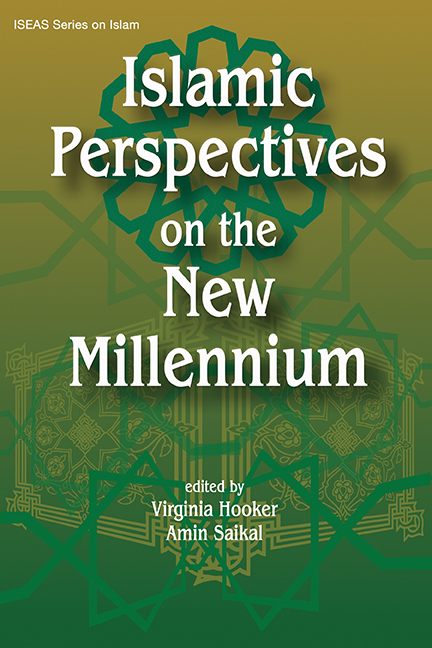Book contents
- Frontmatter
- Contents
- Acknowledgements
- Contributors
- 1 Islamic Perspectives on the New Millennium
- The New World Order
- The New Age
- The Economy
- The Nation-State
- Muslim Women
- 10 Muslim Women and Human Rights in the Middle East and South Asia: Occupying Different Spaces
- 11 Islam, Gender, and Politics in Indonesia
- Law and Knowledge
- Conclusion
- Glossary
- Index of Names
- Index of Subjects
11 - Islam, Gender, and Politics in Indonesia
from Muslim Women
Published online by Cambridge University Press: 21 October 2015
- Frontmatter
- Contents
- Acknowledgements
- Contributors
- 1 Islamic Perspectives on the New Millennium
- The New World Order
- The New Age
- The Economy
- The Nation-State
- Muslim Women
- 10 Muslim Women and Human Rights in the Middle East and South Asia: Occupying Different Spaces
- 11 Islam, Gender, and Politics in Indonesia
- Law and Knowledge
- Conclusion
- Glossary
- Index of Names
- Index of Subjects
Summary
Megawati Sukarnoputri was installed as Indonesia's fifth president on 23 July 2001 (see Mietzner 2000). Although her party, the PDI-P (Partai Demokrasi Indonesia–Perjuangan, or Indonesian Democratic Party of Struggle), won the largest number of seats in the 1999 general election (the first free election following the toppling of President Soeharto), her ascendancy to the presidency had been blocked by the political manipulations of Abdurrahman Wahid, who came to power as the fourth president on the strength of a coalition of Muslim-identified parties. There had been vigorous public debate in the period leading up to the general election in 1999 about whether a woman president was acceptable under Islamic doctrine and whether Indonesia, with a majority Muslim population, could accept a woman president. The negative arguments were based on textual interpretations of the Qur'an and Hadith.
An analysis of this debate demands a broader context: to what extent has public debate in Indonesia about women's participation in public life rested on Islamic textual interpretation? To what extent has Islamic doctrine determined the limits and possibilities of women's political participation, in the way that it has done in many other countries which have a majority Muslim population?
INDONESIAN ISLAM AND DEBATES ABOUT WOMEN'S POLITICAL PARTICIPATION: THE HISTORICAL CONTEXT
To gain an impression about what has been written on this topic, I conducted a quick review of the Indonesian-published books dealing with “Indonesian women” which I had on my bookshelf — not a comprehensive or scientific survey, but a wide-ranging one, with a mixture of my own collection from the last twenty years — and those in the Australian National University Library, dating back to the 1950s. Many of them are government publications, others are commercially published. In these publications, where Islam is mentioned as a factor impacting on Indonesian women's social participation, it is in respect of family law although adat (custom, tradition) is also seen as relevant in this context. With regard to women's participation in public life, or political institutions, what is commonly invoked is historical precedent, in particular the historical cases of women who were rulers in pre-colonial polities such as Aceh (see, for example, Soewondo 1968; Department of Information 1987).
- Type
- Chapter
- Information
- Islamic Perspectives on the New Millennium , pp. 183 - 196Publisher: ISEAS–Yusof Ishak InstitutePrint publication year: 2004

